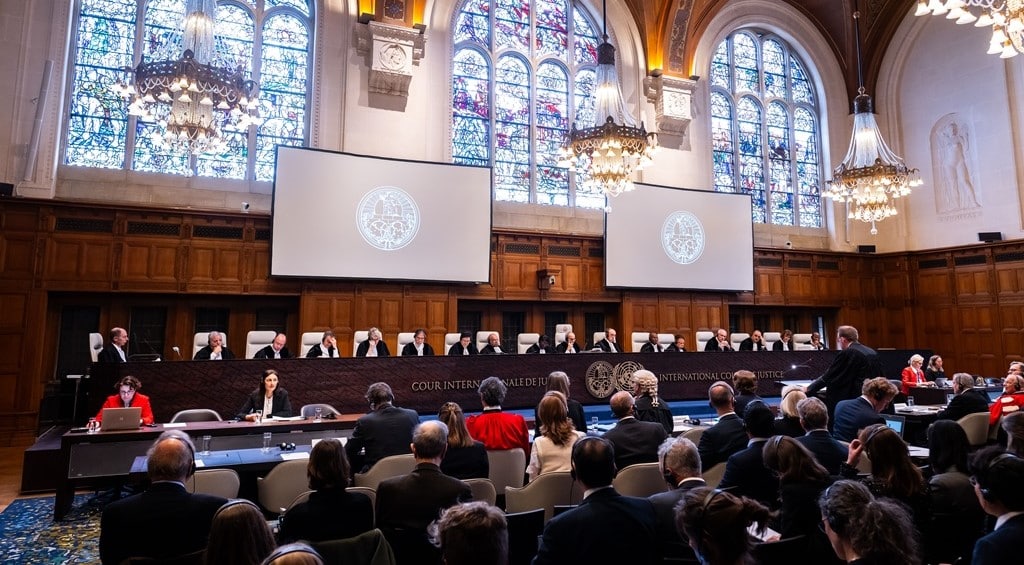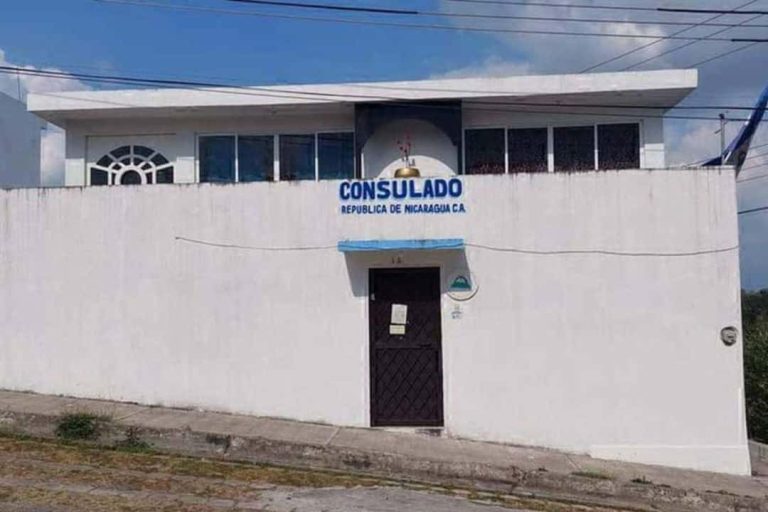27 de febrero 2024

ICJ Rules Against Nicaragua's Request For Germany to Halt Arms Sales to Israel

PUBLICIDAD 1M
PUBLICIDAD 4D
PUBLICIDAD 5D
Nicaraguan migrants react to the closing of consulates. Seven were shut in one month, generating more expenses to those who send remittances

Nicaraguan Consulate in Tapachula, Mexico. Photo: Social media
Dennis, a Nicaraguan migrant from Matagalpa, has been living in California for four years. He applied to renew his Nicaraguan passport at the Los Angeles consulate in September 2023. In the first days of January 2024 he called to find out if his passport was finally ready and the response he received was that "they were closed."
"I was very upset because I need my passport urgently so I can travel to Nicaragua to visit my grandmother, who is ill," he explains.
Now Dennis will have to travel to Miami to get his passport. "I don't know anyone in Miami, so I have to spend more time, and pay more for plane tickets and a hotel to do something I could have easily done in a place where many Nicaraguans live," he claims. He calculates that he will have to spend at least $500 extra. Dennis says he doesn't understand why the Daniel Ortega-Rosario Murillo regime decided to close the Los Angeles consulate.
"I have been sacrificing to save so I can send money to buy medicine for my grandmother and be able to travel soon to be with her during these difficult times, but now I have to pay extra to travel within the U.S. just to get my passport," he laments.
The dictatorship closed at least seven Nicaraguan consulates in less than a month: three consulates in the U.S. and one each in Mexico, Guatemala, England and Germany.
To date, the regime has not explained why it decided to close these consulates that are in cities with large Nicaraguan migrant populations. At the same time, the dictatorship has decided to open new Nicaraguan diplomatic offices in remote countries where there are no significant communities of Nicaraguans, such as Zimbabwe and Burkina Faso.
"It is just one more crime committed by this murderous dictatorship that doesn't want Nicaraguans to return to our country. Daniel Ortega wants to leave us isolated and the only thing that interests him is that we continue sending remittances to sustain the country in the midst of the ruin he has created," Dennis said.
A terse notice on the door is the only notification given by the Ortega dictatorship regarding the closing of Nicaraguan consulates in the United States. On the piece of paper, pasted on the doors of the former consular offices in Los Angeles, California, and Houston, Texas, the authorities only indicate that for "official requests," citizens should "direct their requests" to the consular offices in Miami, New York or Washington, DC.
Mirna, a Nicaraguan who was planning to visit Nicaragua to deal with family matters and spend time with her family, says she was "surprised and greatly disappointed" to learn of the consulate closures.
In the now empty offices, there's not even a telephone number, e-mail or any explanation posted to explain whether some procedures can be dealt with online or if it's necessary to travel in person to other cities.
"It's inhuman to leave us like this, abandoned and without the support that was useful when you needed to do official paperwork. It's impossible to understand what's going on in these people's heads," says Mirna.
Mirna planned to visit Masaya, make some arrangements regarding inheritance and to supervise some houses she is renting out. "But now I will have to spend my time and money trying to get my passport," she says.
Mirna also planned to get a Nicaraguan passport for her youngest son at the consulate in Los Angeles. "But I've already wasted time going several times to the consulate right here in L.A. I can only imagine what will happen now that we have to go to a city on the other side of the United States," she says.
Representatives of the Nicaraguan community in the United States believe that the lack of information and the closing of the consulates demonstrates contempt by the dictatorship towards Nicaraguan migrants in the U.S., despite the fact that they generate some $3.5 billion in family remittances, more than 80% of the total of $4.3 billion registered up through November 2023, according to official data.
Damaris Rostrán, member of the New York and New Jersey Working Group of the Nicaraguan Diaspora, says that the dictatorship has not only abandoned Nicaraguan citizens who emigrated in recent years, but also those who have been in the U.S. for years or decades.
An estimated 400,000 Nicaraguans have arrived in the U.S. in the last five years, adding to the 400,000 others already living in the U.S. since before 2018.
According to Rostrán, migrants look to the consulates for support when they need to deal with formal matters and are unable to travel to Nicaragua because of work issues, immigration status, transportation costs or because "the dictatorship has decided not to let them enter" their home country.
For Roberto, a Nicaraguan exile in Guatemala, it's unheard of that he now has to travel to El Salvador to carry out consular procedures. "They are closing a consulate in a Central American country, a nearby country with a large Nicaraguan population, while at the same time they're opening embassies where the only Nicaraguan is the ambassador," he complains.
Roberto was about to complete paperwork for his two children at the consulate. "I can't go to another country to do it, so I have to wait to see what will happen with the relations between Nicaragua and Guatemala, but for now there's no solution," he says.
"For the Ortega-Murillo regime we're just a number, a number of people who are abroad and who send money to their families. They're only interested in our remittances, nothing else," says Roberto.
This article was published in Spanish in Confidencial and translated by our staff. To get the most relevant news from our English coverage delivered straight to your inbox, subscribe to The Dispatch.
PUBLICIDAD 3M
Confidencial es un diario digital nicaragüense, de formato multimedia, fundado por Carlos F. Chamorro en junio de 1996. Inició como un semanario impreso y hoy es un medio de referencia regional con información, análisis, entrevistas, perfiles, reportajes e investigaciones sobre Nicaragua, informando desde el exilio por la persecución política de la dictadura de Daniel Ortega y Rosario Murillo.
PUBLICIDAD 3D